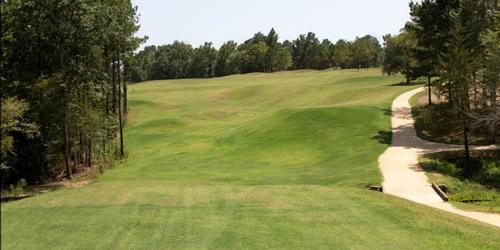
No wall needed: Two courses along the Texas border offer splendid golf challenges
By Steve Habel
ALONG THE TEXAS-MEXICO BORDER - With all the talk and windbag promises by a certain recently elected public official about future plans for America's border with Mexico, we felt it might be time to throw in our own two cents about a couple of splendid Texas golf courses set on respective bluffs high above the wade-across-and-not-get-your-shirt-wet Rio Grande.
Both of the courses - Black Jack's Crossing at the remote Lajitas Resort in the Big Bend of Texas and The Max Mandel Municipal Golf Course outside the bustling south Texas border town of Laredo - have places in their routings where players can tee by an old ball and rip it into Mexico, hitting a shot from one country to another.
There are times when golfers might see a Border Patrol vehicle or speedboat on duty on the courses' edges, but it's silly to think that anyone is make the crossing to play a round or two of golf - no matter how good these tracks are.
If getting away us really your bag, you'll love the Lajitas Golf Resort and Spa. Set on the southwest corner of the Lone Star State, it's roughly 300 miles as the crow files from El Paso and about as remote a place to tee it up as there is in America.
It is a wildly beautiful natural region, with a complex and fascinating history. The landscape in the Big Bend is not for the faint of heart or the thin-skinned. Here in the few places flat enough to pitch a tent, build an adobe house and eventually a posh resort, the land rolls away on both sides of the Rio Grande, and it takes a different attitude to exist, more less thrive.
Black Jack's Crossing, designed by World Golf Hall of Famer Lanny Watkins, is one of the resort's calling cards.
After a devastating flood wiped out a previous Lajitas design that was set on the river's bank in 2008, Watkins was chosen from an "A" list of architects to fashion the new course on land in the mountain valleys and foothills, away from the chance of repeat disaster.
Watkins' golf course calls out to anyone with the nerve enough to tackle its rocky elevation changes, its numerous carries over desert washes and a set of holes that require the best golf game a player can muster.
Lajitas means flat stones and the course's routing takes advantage of the dramatic drops from tee to fairways and vistas that stretch as far as the eye can see. There are at least seven elevated tees and on a clear day you feel as if you can see the edge of the world in almost every direction. The tee shots are exhilarating - a few drop as much as 180 feet from tee to green.
Black Jack's Crossing is carded as a par-72 and at 7,413 yards from its back set of four tees. Watkins' decided to grass the course from tee to green on the course with peplum, which thrives in the arid conditions.
The course's fairways are generous but sometimes seem small from the tee due to the elevation changes and the multiple forced carries. The greens are medium in size but challenging and fast with great undulation.
The first three holes of Black Jack's Crossing play in the Rio Grande river valley and then the routing climbs into the mountains and foothills. Five holes bring the river back into view, and each hole seems to bring another interesting and unique geological formation or a different color into view.
Getting to Lajitas is half the fun and worth the trouble. But to make this trip worthwhile, the golf course and other amenities have to be special - they are.
"Lajitas and the golf course are memorable because don't think there's another site like this anywhere in the state," Watkins said.
Since opening in 2012, Black Jack's Crossing's has been named the "Best Golf Course You Can Play in Texas" by the Dallas Morning News, "Most Beautiful Course in Texas" by Golf Magazine and the "Best Course You Can Play in Texas" also by Golfweek.
Head east and then southeast down the Rio Grande about 460 miles - have you forgotten about how long the border between Texas and Mexico is? - and you'll run smack into The Max Mandel Municipal Golf Course hard on the north bank of the river.
Called "The Max" by locals, the Robert Trent Jones, Jr. designed-course is fulfilling a mission to make great golf available for an underserved market, to help grow the game for youth in South Texas and - quite frankly - to shed a little positive light on an area that has been marred by the uncontained drug-related violence just across the river in Nuevo Laredo.
The land for the course, located on a 270-acre site about 10 miles from downtown Laredo, was donated to the City by the family of the late Max A. Mandel, a Laredo bank executive and economic visionary. Water is not an issue, because the Rio Grande skirts the course's western boundary and could be tapped into at will.
Routed along bluffs overlooking the Rio Grande across to Mexico, the site encompasses almost a mile of riverfront property. The course presents four holes that play adjacent to and high above the water and navigates through 30-foot tall mesquite woodlands and upon open farmland.
The Max provides an excellent balance of drama, playability and risk/reward that combine to form an exciting and enjoyable round of golf. Playing at a par of 72 and at 7,069 yards from its back tees but with four more teeing grounds at the player's option, there are wide, inviting fairways throughout and challenging putting surfaces and green surrounds.
Within the property, two deep arroyos boldly illustrate how the natural systems shaped the site through the centuries, depicting the pendulum swing between extended periods of arid, dry conditions and brief but intense rain events typical of this region. These arroyos serve as key strategic and aesthetic elements throughout the golf course and come into play on six holes.
The Max's routing creates "courses within the course" on the back-nine, which stages returning three- and six-hole loops that flank the expansive practice facility. This concept maximizes The Max's ability to provide instruction for all levels of golfers, especially beginners.
"With the wealth of natural features at our disposal, all manner of hazards have been incorporated throughout the golf course from native edges, to elevation change, to subtle slopes and contouring and finally to the formal bunkers - large and small - used sparingly," Jones, Jr. said.
The Max lives up to its moniker. It's a welcome addition to the golf options of south Texas and the type of course that will draw folks back to the border.
Revised: 02/07/2018 - Article Viewed 14,555 Times
- View Course Profile
About: Steve Habel
 Steve Habel is a contributing editor for GolfTrips and its associated websites. A 26-year industry veteran, he regularly contributes to various regional, national and international golf publications and has played and written about more than 1,600 golf courses around the world.
Steve Habel is a contributing editor for GolfTrips and its associated websites. A 26-year industry veteran, he regularly contributes to various regional, national and international golf publications and has played and written about more than 1,600 golf courses around the world.
Habel is also senior editor for Horns Illustrated magazine, a publication focusing on University of Texas sports, as well the San Antonio Spurs beat writer for The Sports Xchange. He is a correspondent for the Austin American-Statesman and frequently files stories and features for The Associated Press and Preferred Lifestyle magazine.
Habel, who lives in the Austin, Texas area, has worked media coordinator for World Golf Hall of Fame player and golf architect Tom Kite as well as for renowned golf architects Roy Bechtol and Jeffrey D. Brauer.
He is a member of the Golf Writers Association of America, the Texas Golf Writers Association and the Football Writers Association of America.
Follow Steve Habel:
Contact Steve Habel:
GolfTrips.com - Contributor

















